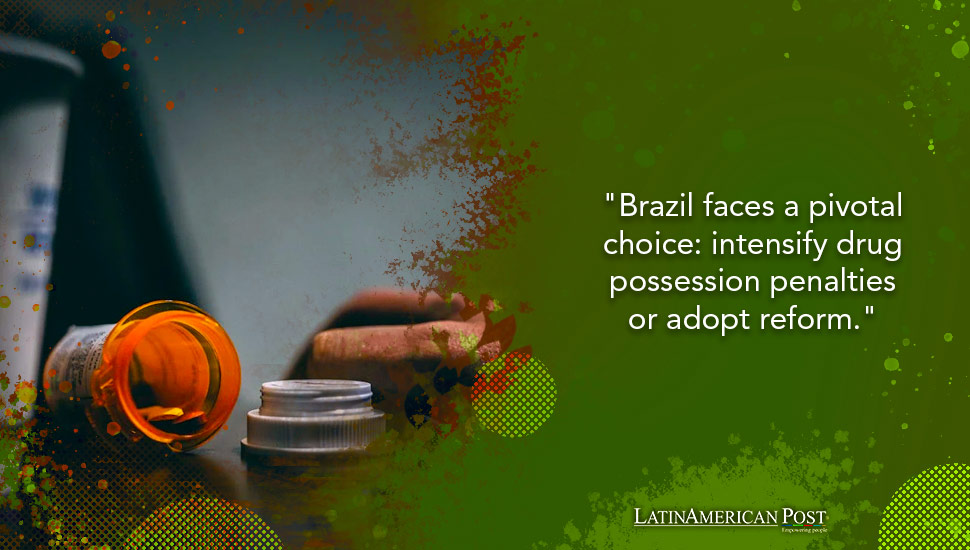Brazil’s Drug Policy Debate: Rights Versus Rigor

Brazil faces a pivotal choice: intensify drug possession penalties or adopt reform. This legislative crossroad provokes heated debate, reflecting a broader Latin American struggle with drug policy and human rights.
In Brazil’s lively democratic arenas, a critical discussion is brewing—one that pits traditional punitive approaches against emerging voices for progressive reform in drug policy. Human Rights Watch (HRW) has urged Brazilian lawmakers to reject a constitutional amendment that seeks to intensify the criminalization of possession of any illicit drugs, regardless of amount. This stance catalyzes a broader Latin American conversation on how societies deal with the complex issue of drug use and its consequences.
Here, Proponents of Tougher Stance
On one side of the divide, proponents of the amendment argue for a more robust anti-drug stance. They see criminalization as a necessary deterrent, reinforcing societal norms and aiming to curtail the widespread effects of drug misuse. The conservative push in the Brazilian Congress advocates for a hardline approach, emphasizing law enforcement and reflecting a longstanding war on drugs that has characterized much of the region’s history.
This perspective contends that leniency could lead to higher drug consumption rates, potentially spiraling into a public health crisis. In their view, the judicial system’s intervention in drug possession is a form of protective rigidity that maintains order and discourages the drug trade. It’s a viewpoint that leans into the notion that without stringent laws, drug abuse and related crimes could escalate, harming the fabric of society.
Contrastingly, HRW’s admonishment of the proposed legislation illuminates the other side of this heated discourse. Their appeal to the Brazilian Congress is grounded in the belief that decades of punitive drug policies have not curbed drug misuse but have instead resulted in grave human rights violations and a bloated prison population. They point out that the current approach disproportionately affects young black Brazilians with lower education levels, often jailed for minor possession.
Critics of criminalization assert that penal measures have failed to differentiate effectively between users and traffickers, leading to an overburdened judicial system and overcrowded prisons. They argue that a health-based approach, focusing on prevention and treatment rather than punishment, could lead to better outcomes for individuals and society. In this vein, they recommend following the example of other countries decriminalizing possession for personal use.
Global Trends towards Decriminalization
Indeed, a growing trend in Latin America and beyond favors decriminalization and harm reduction strategies. From Portugal’s groundbreaking decriminalization policy to Uruguay’s legalization of cannabis, there is mounting evidence that shifting the focus from criminal justice to public health can reduce drug-related harm and address underlying social issues.
Moreover, critics of the proposed amendment argue that the punitive model diverts precious resources away from tackling organized crime networks, which continue to thrive despite harsh drug laws. HRW recommends that authorities concentrate on dismantling these organizations and the corrupt systems that support them rather than penalizing users, who are often the easiest targets.
Supporters of the amendment, however, question whether decriminalization could inadvertently aid drug traffickers by easing the pressure on their operations. They worry that without the fear of legal consequences, the threshold for drug experimentation and use could lower, potentially exposing more individuals, particularly the youth, to the risks associated with drugs.
Meanwhile, the data paints a stark picture of racial and socioeconomic disparities in drug-related legal processing, spotlighting the systemic bias that afflicts marginalized communities. The overrepresentation of young, black, and educationally disadvantaged individuals in drug convictions calls into question the fairness of the justice system and the efficacy of the policies it enforces.
This debate in Brazil is a microcosm of the larger Latin American struggle with drug policy. Countries across the region grapple with the fallout from the war on drugs, searching for a balance that protects citizens without infringing on their rights or perpetuating inequality. The outcomes of these debates will have far-reaching implications for regional security, public health, and social equity.
As Brazil’s Senate prepares to vote, the nation and the international community are focused on the country’s choice. Will Brazil double down on traditional punitive measures or chart a new course toward progressive reform?
In writing this narrative, one cannot ignore the voices of the marginalized, who are often caught in the crossfire of this policy war. Our stance on drug policy reflects our collective values and vision for society’s future. In a region marred by the scars of drug wars, Brazil’s decision could set a precedent, either reinforcing a cycle of incarceration and inequality or paving the way for a new, more humane approach to a challenge that touches every corner of society.
Navigating Complexity with Nuance
As this debate unfolds, it serves as a critical reminder of the delicate balance between safeguarding communities and upholding the rights of individuals. It calls for a nuanced understanding that sees beyond the black-and-white narrative of criminalization versus legalization, recognizing the complex human dimensions of drug policy and its impact on society’s most vulnerable.
Also read: Brazil Launches Program for ‘Blue Economy’ Through Reef Preservation
Brazil stands at a crossroads with a decision that could resonate throughout Latin America. The outcome of this amendment will speak volumes about the country’s readiness to confront the nuanced realities of drug policy and its commitment to crafting solutions that are as compassionate as they are effective. The hope is that wisdom, evidence, and respect for human dignity will guide Brazil’s hand as it casts its pivotal vote.





